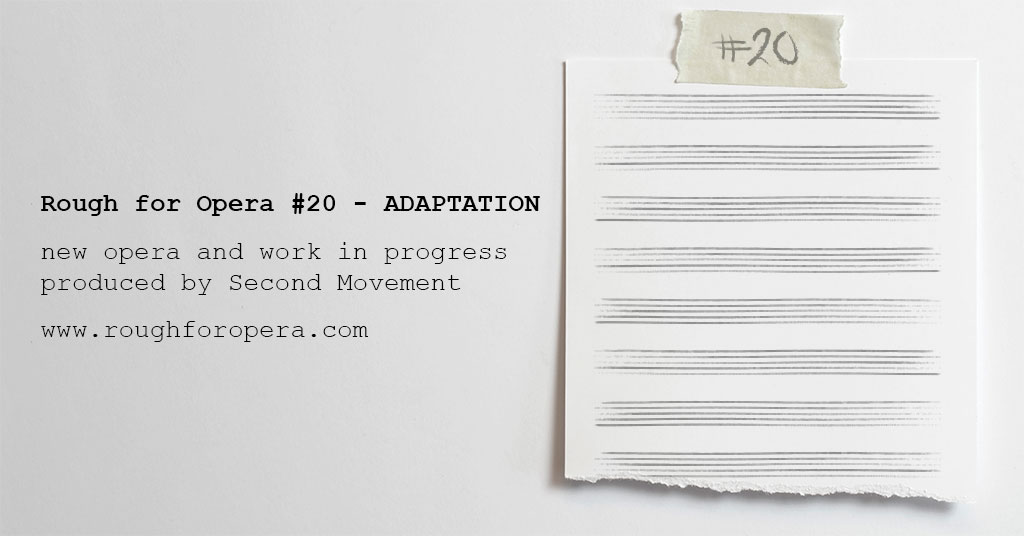
Rough for Opera #20 – ADAPTATION
3.30 pm and 7.30 pm, 4th December 2025
Chelsea Theatre, 7 World’s End Place, Chelsea, London, SW10 ODR
____________________________________________________________________________
Thank you to everyone who came to our showings!
If you were in the audience and would like to give feedback, we would love to hear what you thought:
audience feedback form here
____________________________________________________________________________
A work in progress sharing of three new 9 minute operas commissioned by Second Movement, each adapted from a single source, Note 615 on “The Scream” by Edvard Munch, English translation by Eirill Alvilde Falck. Note 615 (1892) is Munch’s first articulation, in text, of the image which would become the paintings, drawings and lithographs of The Scream, one of the world’s most recognised motifs. The operas explore themes of alienation, anxiety, displacement, grief and loss, written for a shared cast of baritone, mezzo, soprano, bassoon, cello and violin.
Another Day
Sarah Forbes text
Elif Karlıdağ music
Maelstrom
Romanne Walker text
Vinicius Motta music
Exposure
Nicola Warner text
Zhenyan Li music
____________________________________________________________________________
Adapted from Notes on “The Scream” by Edvard Munch
English translation of Note 615 on “The Scream” by Edvard Munch by Eirill Alvilde Falck
Originally published in the February 2022 issue of Poetry
____________________________________________________________________________
Finn Beames director
Olivia Clarke music director
Claire Shovelton creative producer
Abigail Toland creative director Second Movement
Ella Taylor soprano
Suzie Purkis mezzo
Julian Chou-Lambert baritone
Chihiro Ono violin
Ben Michaels cello
Jo Turner bassoon
Pei Hong Chew stage manager
Jonathan Goldsmith surtitles
Leonora Shovelton Front of House for Rough for Opera
Roisin Murphy archive video
Erika Gundesen workshop conductor
Chris Allan workshop cello
Craig Fuller workshop photography
____________________________________________________________________________
Rough for Opera is Second Movement’s platform for new opera and work in development. The first Rough for Opera was in October 2011. Since then it has platformed more than 40 new operas and operas in development. Each Rough for Opera is programmed from an open call, from 2022 Rough for Opera has particularly focused on supporting new work by disabled artists. Second Movement uses an inclusive definition of disability based on the social model.
____________________________________________________________________________
read more about the Rough for Opera #20 creatives and performers here
____________________________________________________________________________
Synopses
Another Day
Sarah Forbes text
Elif Karlıdağ music
Content warning: Inspired by Edvard Munch’s text behind The Scream, this piece explores the emotional distance between a friend in pain and those close to them. One hears the scream within; the others continue their chatter, unaware. At its heart lies the struggle to be heard; when the world is too loud, and one’s voice becomes a silent cry.
Two Friends hope a stroll in the fresh evening air will lift the Screamer out of their dark and brooding mood but the Friends’ platitudes only leave the Screamer feeling increasingly disconnected from the world, trapped by the isolating pain of their grief. A howl erupts from the ground, the sky filled with the Screamer’s blood as they are broken open by its force. At last they will be set free. But when the Screamer lands back in their body nothing has changed and as the sun sets they are left to face another day alone.
Maelstrom
Romanne Walker text
Vinicius Motta music
Content Warning: This opera deals with grief and the death of children
In the dark fjords of Norway a man is tugging a boat through knee-high water, in which his two children sleep. Fleeing from danger and displacement, he has struggled through an ice-cold night to reach a border that they will cross to safety. However as the morning dawns, heralded by twobird-shaped omens that fly above them, he realises that his children have not survived the night. Overwhelmed by grief and haunted by his regrets, he meticulously prepares a burial ritual and releases his children into the water in the hope that they will find peace in the afterlife.
Exposure
Nicola Warner text
Zhenyan Li music
Content Warning: This opera explores mental health including psychosis, schizophrenia and dementophobia/psychosis OCD. It features inpatient psychiatric treatment, grief and exposure response prevention (ERP) therapy.
Eddie visits his sister Laura at an acute psychiatric ward where she is a service user. He feels unable to enter the hospital due to his dementophobia OCD so takes her portrait outside in the grounds. At first, she is lucid but as Eddie begins to talk about the anniversary of their sister Sophie’s death, Laura starts to experience psychotic symptoms. While hallucinating, Laura begs Eddie to take her back inside but he is paralysed by anxiety so she leaves. He compulsively takes a photograph of the sky and checks it to reassure himself that he is not seeing things.